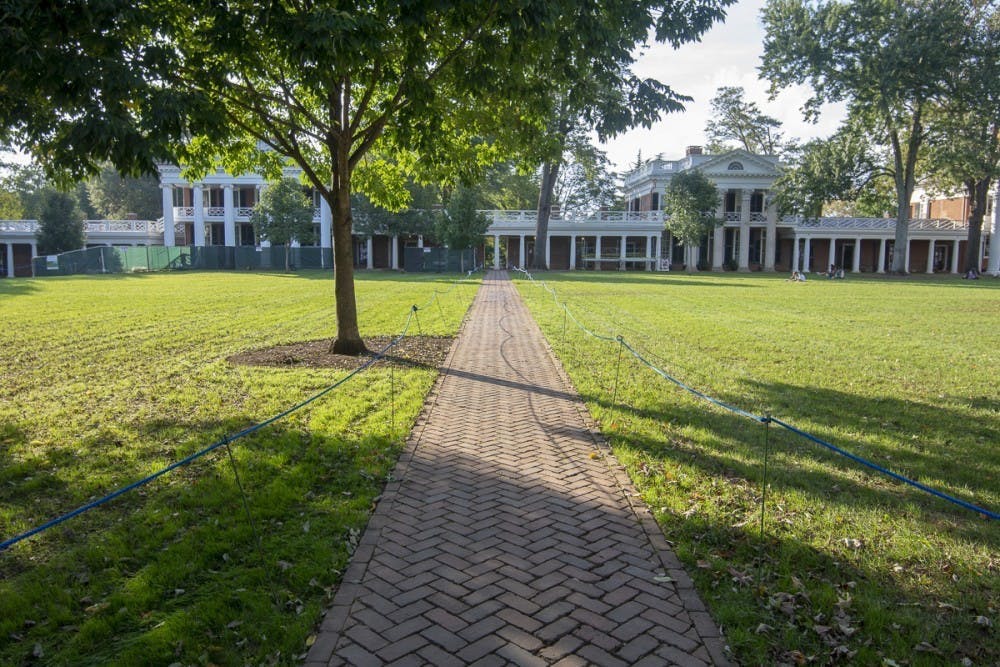While you may be enjoying pulling on a sweatshirt on your way to an early morning class this week, don’t forget that just recently Charlottesville was sweltering.
The temperature reached 94 degrees Fahrenheit Oct. 2, and the following day the mercury hit a high of 96 degrees Fahrenheit — an outrageous heat for October. It was also unprecedented. Over the last 10 years, the average high of the first week of October was only 74 degrees Fahrenheit, and no week saw a temperature higher than 89 degrees Fahrenheit. As reported by the Daily Progress and NBC29, Oct. 3 made for the hottest October day in Charlottesville’s recorded history, breaking the previous record of 94 degrees Fahrenheit set in 1941. Charlottesville wasn’t alone in what was a nationwide trend. Hundreds of other weather stations across 30 different states recorded their highest October temperature on record as well.
This record-setting heat appeared to elicit different responses from students around Grounds. Most people likely either did not notice or did not care, and they went about their day as normal. Some people may have noticed but appeared relatively unconcerned. Maybe they offered an off-handed comment about climate change really existing. Simply, life proceeded as normal, even as indicators around us are screaming at us that it’s not.
We are in the midst of an unprecedented crisis. Global temperatures are rising at an unsustainable rate and our current inaction threatens the world and our future. Charlottesville is just an example of this trend.
While it is difficult to estimate future temperatures, most predictions, like those of the U.S. The National Oceanic and Atmospheric Administration holds that if current trends continue, the average global temperature will likely increase by about 2 to 4 degrees by the year 2050. While this may seem like a small change, even a few degrees increase in temperature such as this carries immense consequences. If this trend continues into 2050, there will, unsurprisingly, be more frequent hot days with dangerous consequences for humans. For example, in 2003, Europe experienced a significant summer heatwave that was 104 degrees Fahrenheit at its hottest, which is only a few degrees higher than Virginia’s hottest day on record. That heatwave killed around 52,000 people.
Additionally, in this hotter world, we will face significant increases in extreme weather events like wildfires and category five hurricanes, as well as widespread species loss and overall reduced agricultural output. Extended warm spells coupled with increases in average rainfall will lead to longer droughts interrupted by more intense rains and flash floods. Furthermore, the changing climate will expose an estimated 388 million more people to water scarcity and about 200 million to extreme drought conditions.
The changing climate will affect different areas of the world disproportionately. Close to home, by 2050 Washington, D.C. is poised to experience a mean annual temperature increase of 5.4 degrees and the warmest month’s temperature is predicted to increase by 7.5 degrees. In Charlottesville, it’s easy to see how a similar increase in temperature might affect daily life for the University and its students. The Lawn rooms could need to install AC units. Athletic teams might have to hold mandatory water breaks during practices and games. The Lawn might have to be resodded and flowers replanted more often to maintain the University’s charming aesthetics.
While that sounds quite disruptive, it is minuscule in comparison to what will happen in other parts of the world, those with the fewest resources and lowest capacity to address or adapt to climate change. Sub-Saharan Africa, South Asia and Latin America are particularly vulnerable to the effects of climate change. The World Bank approximated that by 2050 an estimated 143 million people from these regions will be forced to migrate due to adverse weather patterns and resource scarcity.
This is the perverse irony and great injustice of climate change. While the Global North has contributed the most towards accelerating climate change, it is the Global South which will bear its consequences. As we as a community begin to look back through our history to attempt to rectify and address centuries of injustice, we must not ignore the unjust actions we are committing today. Our current unsustainable lifestyles are not just impacting our own lives, but creating disasters for hundreds of millions of people in the Global South.
Moreover, while we have used an unusually hot day to talk about climate change, we should be careful not to think of climate change as just a hot day here or there. It’s not singular bumps in temperature, but is a long-run, unrelenting increase in average temperatures. So, as we head into the winter season and that 96 degree October day seems so long in the past, it’s important to remember that climate change is happening and that a much hotter world is only 30 years away.
In order to alter this trajectory, we can’t brush this issue aside and we can’t ignore it as we have this past week — we have a tendency of diverting our attention when confronted with climate change articles. We have to accept the discomfort of this information, educate ourselves on the issue and learn about potential solutions. For these reasons, it’s important to make a concrete plan in order to reduce your own carbon footprint.
Cameron Haddad is a second-year Master of Public Policy student in the Batten School.
Lucy Bassett is an Associate Professor of Practice of Public Policy in the Batten School.







